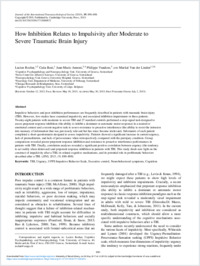How inhibition relates to impulsivity after moderate to severe traumatic brain injury
- Rochat, Lucien Cognitive Psychopathology and Neuropsychology Unit, University of Geneva, Switzerland - Swiss Centre for Affective Sciences, University of Geneva, Switzerland
- Beni, Catia Cognitive Psychopathology and Neuropsychology Unit, University of Geneva, Switzerland
- Annoni, Jean-Marie Neuropsychology Unit, Geneva University Hospital, Geneva, Switzerland - Neurology Unit, Department of Medicine, University of Fribourg, Switzerland
- Vuadens, Philippe Clinique Romande de Réadaptation, Sion, Switzerland
- Linden, Martial Van der Cognitive Psychopathology and Neuropsychology Unit, University of Geneva, Switzerland - Swiss Centre for Affective Sciences, University of Geneva, Switzerland - Cognitive Psychopathology Unit, University of Liège, Belgium
-
2013
Published in:
- Journal of the International Neuropsychological Society. - 2013, vol. 19, no. 08, p. 890–898
English
Impulsive behaviors and poor inhibition performances are frequently described in patients with traumatic brain injury (TBI). However, few studies have examined impulsivity and associated inhibition impairments in these patients. Twenty-eight patients with moderate to severe TBI and 27 matched controls performed a stop- signal task designed to assess prepotent response inhibition (the ability to inhibit a dominant or automatic motor response) in a neutral or emotional context and a recent negative task to assess resistance to proactive interference (the ability to resist the intrusion into memory of information that was previously relevant but has since become irrelevant). Informants of each patient completed a short questionnaire designed to assess impulsivity. Patients showed a significant increase in current urgency, lack of premeditation, and lack of perseverance when retrospectively compared with the preinjury condition. Group comparisons revealed poorer prepotent response inhibition and resistance to proactive interference performances in patients with TBI. Finally, correlation analyses revealed a significant positive correlation between urgency (the tendency to act rashly when distressed) and prepotent response inhibition in patients with TBI. This study sheds new light on the construct of impulsivity after a TBI, its related cognitive mechanisms, and its potential role in problematic behaviors described after a TBI.
- Faculty
- Faculté des sciences et de médecine
- Department
- Médecine 3ème année
- Language
-
- English
- Classification
- Biological sciences
- License
-
License undefined
- Identifiers
-
- RERO DOC 205539
- DOI 10.1017/S1355617713000672
- Persistent URL
- https://folia.unifr.ch/unifr/documents/303302
Statistics
Document views: 132
File downloads:
- Fichier principal: 242
